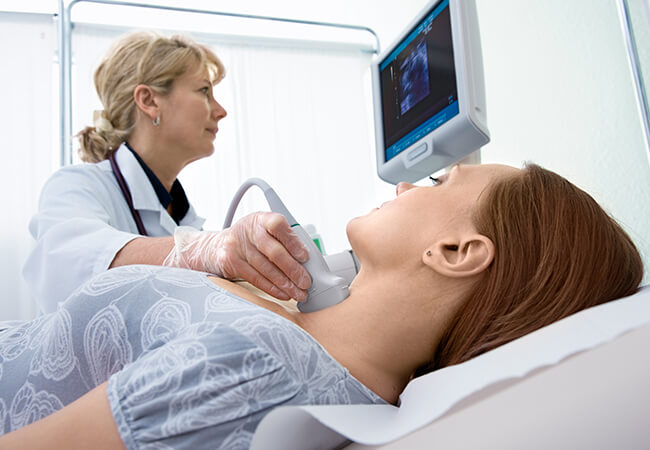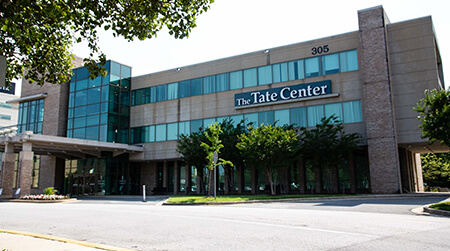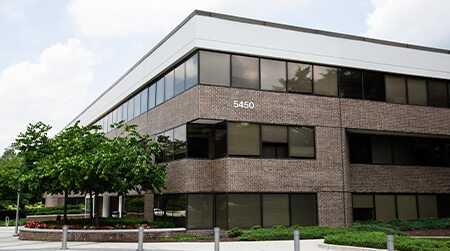

The thyroid gland produces hormones to help control your metabolism, blood pressure, heart rate, and body temperature. Thyroid cancer develops when the cells in your thyroid undergo genetic mutations that cause the cells to grow and multiply rapidly as the cells simultaneously lose the ability to die, as normal cells would. These cancerous thyroid cells result in a tumor.

At Chesapeake Oncology Hematology Associates, our oncologists and medical team can effectively treat thyroid cancer using one or more combinations of treatments. We offer the latest cancer treatments available in a comfortable treatment environment to ensure the best possible outcomes.
Most thyroid cancers can be treated surgically. There are two main types of thyroid cancer surgery. The first is total thyroidectomy, where the surgeon removes the entire thyroid gland along with lymph nodes adjacent to the tumor or in the neck/chest may also be removed.
The second is lobectomy/hemithyroidectomy, where only the side of the thyroid affected by the tumor is removed. This surgery is usually only performed on small, well-differentiated thyroid cancers that haven’t spread.
New radiation therapy techniques allow our highly skilled doctors at COHA to target tumors more accurately, ensuring the maximum amount of radiation to the cancerous cells with minimal damage to healthy ones. There are two forms of radioactive treatments for thyroid cancer.
The first is radioactive iodine for thyroid cancer, where the patient orally ingests a medicine containing radioactive iodine, which targets and kills the thyroid cancer cells. The second is external beam radiation that may be used against the remnants of a thyroid cancer tumor after surgery or cancers that don’t respond much to other treatments.
This treatment is often recommended after thyroid surgery to substitute the hormones that aren’t being produced by your (now-removed) thyroid tissue. Depending on the amount of thyroid gland removed, you may need to take the treatment for the rest of your life. The treatment can also help avert the recurrence or growth of thyroid cancer.
Chemotherapy kills cells that grow and spread quickly, like cancer cells. Anaplastic thyroid cancer is often treated with a combination of external beam radiation therapy and chemotherapy.

8:00 AM ~ 4:30 PM (M-F)

8:00 AM ~ 4:30 PM (M-F)

8:00 AM ~ 4:30 PM (M-F)
Thyroid nodules are fluid-filled or solid lumps that develop inside your thyroid gland. Thyroid nodules are usually not a serious concern and don’t cause any major symptoms. However, a small percentage of such nodules can be cancerous. Speak with our providers for a diagnosis.
Some thyroid cancer symptoms in females include:
Our team will discuss the treatment choices available for your condition and develop a personalized treatment plan. We will also explain the risks, benefits, and alternate options of each treatment. Patients will generally be treated through surgery. However, it may be combined with radioactive iodine and other therapies if needed depending on your needs.
To avoid putting any strain on your neck wound, don't move anything heavy for at least two weeks after thyroid surgery. You'll need to take some time off following your surgery if you work. After their operation, most people can return to work in around two weeks. You will need to recover from thyroid surgery for some time. However, you should be able to resume your normal activities soon.
However, patients undergoing iodine treatment for thyroid should know that radioactive iodine emits radiation. So, after your treatment, you won't be allowed to travel home via public transportation such as buses, subways, trains, or planes. You can drive yourself home, have someone pick you up and drive you home, or take a taxi or a private vehicle.
Cancer cells typically appear different from normal ones. Therefore, the type of thyroid cancer is determined by microscopically examining the thyroid cells found in the nodule or growth. We may remove the nodule or mass and analyze it to determine the type of cancer.
Side effects of thyroid surgery include:
Side effects of radioactive iodine therapy for thyroid cancer include: